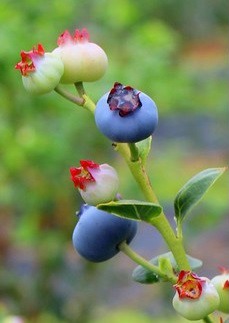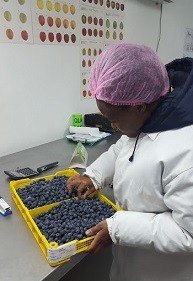 The South African Berry Producers’ Association, a voluntary organisation, was brought into being seven years ago to act as a collective body representing the nascent industry, and specifically in addressing the registration of chemicals for use in blueberry production.
The South African Berry Producers’ Association, a voluntary organisation, was brought into being seven years ago to act as a collective body representing the nascent industry, and specifically in addressing the registration of chemicals for use in blueberry production.
“The limited availability of pest management chemicals is one of our biggest challenges. Chemical registration is very expensive and while the industry was small, large companies didn’t easily spend large amounts of money to get chemicals registered, and it was one of our biggest frustrations from the start: you would literally see your crop wither in front of your eyes and you can’t do anything. This aspect takes up most of SABPA’s time and where most of our funds go,” explains Jeán Kotzé, new chairperson of SABPA.
Jeán is a director of the Winterwood Holding SA Group, part of the UK-based Winterwood Farms Group, which has various berry production units in South Africa, among them Dreammaker Fruits near Porterville (Western Cape) which has been producing blueberries for 16 years. “Looking at where the industry is today, it is difficult to believe that the country wasn’t exporting a single tonne of blueberries at the time I became involved with the Dreammaker Fruits operation in 2002.” This year, South Africa’s blueberry production is expected to surpass 10,500 tonnes.
The blueberry industry has been garnering positive press in South Africa for its high labour requirements – approximately three to four workers per hectare – which serves the industry as welcome political capital in an uncertain policy environment. Most of the black economic empowerment projects within the blueberry industry have arisen voluntarily, driven by producers themselves.
SA blueberry industry’s favourable reputation built upon closed cultivars, but future could bring more open cultivars and more variable quality
The South African blueberry industry was built on closed cultivars and tight partnerships between breeders, producers and marketers, but there is movement to introduce more cultivars that are not tied in with a specific marketing agent in what some see as an exciting development that will open up the South African industry.
“Without the closed cultivars, the product of schemes between producers and nurseries for exclusivity on certain cultivars, the South African industry wouldn’t have been where it is now,” Jeán says. “Closed cultivars have the effect that it limits entrants to the industry, due to high costs, but its advantage is twofold: blueberry companies are willing to take the risk and they can build very good market relationships from within a controlled environment. Because of this, overseas markets have developed a favourable impression of South African blueberries, and this could easily be dented if blueberries were planted left, right and centre."
"The other advantage is that the monies paid for exclusivity find its way back to the breeders, which wasn’t the case in the past. It’s a new business model, and it stimulates the breeder, enabling them to spend more on infrastructure and technology. In this way, genetic improvements happen much quicker. What we’ve seen internationally in blueberries is the nett effect of money flowing back to breeders.”
“In my opinion the environment will change and within the next five to ten years there’ll be a lot more open cultivars on the playing field, or if cultivars have royalties, it won’t necessarily be associated with a specific export agent. There will be many more options within the blueberry industry and the market will experience a wider variation of berry quality from South Africa, which will also bring about a change in the marketing environment. One can see this as part of the maturation of an industry and I believe it’s necessary in order to make it easier for new entrants to the industry.”
 Freeze-drying offers much potential
Freeze-drying offers much potential
He sees room for growth in the processing of blueberries, currently a small aspect of the local industry. “I don’t foresee much change in the export-to-processing ratio in the short term, but personally I think as more and more berries internationally are processed, and the supply is still not meeting the growing demand, the balance between fresh and processing will come closer and I think there will come a stage when it could be difficult moving volumes of highly perishable product very quickly."
"When blueberries are freeze-dried – like the vegetables you find in instant soup packets – the fruit retain their full nutritional integrity. If you add freeze-dried blueberries, whether as a powder or whole or sliced, you add the entire nutritional value of a blueberry to a product. You could add this to a hamburger or even dog food. The health studies that are being conducted on the beneficial effect of blueberries on memory, for instance, aren’t done with fresh blueberries but with freeze-dried blueberries.”
“My gut feeling is that the health elements on which blueberries are capitalizing, and which is driving sales, will extend in this manner, because not everyone likes fresh blueberries, but in this way you can still ingest its health benefits. I think there’ll be new developments in this field which will open new channels for the industry.”
On the local market blueberry sales are growing by double digits year-on-year and the market is far from saturated. He believes there’s still much opportunity over the longterm at lower price levels, but local blueberry prices will only start coming down – despite increasing production – when internationally, prices are stabilising and gradually moving downwards.
Static raspberry industry, some short term growth potential on blackberries
SABPA also represents the much smaller raspberry and blackberry industries. Because of shelf life limitations, these berries have to be flown out, leaving South African producers with very little room to manoeuvre, especially on raspberries. The long term expectation is that producers could shift their focus towards the domestic market.
For more information: Elzette Schutte
Elzette Schutte
South African Berry Producers’ Association
Tel: +27 21 870 2900
Email: saberries@hortgro.co.za
